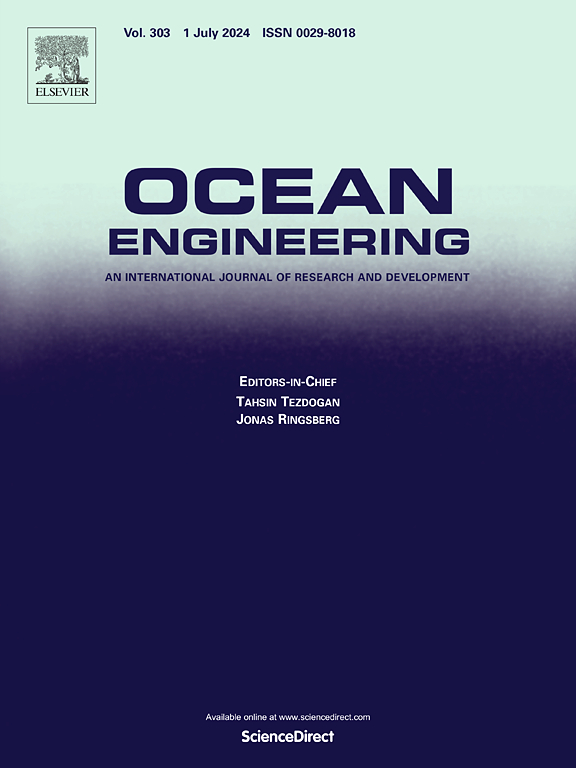Research on SINS/DVL integrated navigation method assisted by acoustic Doppler delay velocity information
IF 5.5
2区 工程技术
Q1 ENGINEERING, CIVIL
引用次数: 0
Abstract
Facing the demand for precise navigation in the complex maneuvering environment, it's necessary to enhance the platform's robust navigation capability under maneuvering conditions. However, the acoustic information from the Doppler velocity log (DVL) exhibits delay, causing asynchronous data fusion and reducing navigation accuracy for the combined Strap-down Inertial Navigation System (SINS)/DVL navigation system. Therefore, this paper aims to compensate for the delay to improve the navigation accuracy of the SINS/DVL system in a dynamic environment. Firstly, the reasons for the acoustic delay are explained by the Doppler effect and the working principle of DVL. Then, it establishes the mathematical relationship between acoustic delay and navigation error. Finally, a novel navigation algorithm, the TRDDKF (Transmitting and Receiving Double Delay Compensated Kalman Filter) algorithm, is proposed to fully compensate for acoustic delay. This algorithm revises the traditional Delayed Kalman Filter (DKF) algorithm framework. Under simulated maneuvering conditions, the TRDDKF demonstrates 93 % and 76 % higher average navigation accuracy than the Kalman Filter (KF) and the DKF, respectively. In lake trial maneuvering conditions, the TRDDKF achieves 98 % and 56 % improvements over the KF and the DKF. The experimental results reflect the necessity of processing acoustic delay and the feasibility of this paper's method.
声学多普勒延迟速度信息辅助SINS/DVL组合导航方法研究
面对复杂机动环境下的精确导航需求,需要提高平台在机动条件下的鲁棒导航能力。然而,来自多普勒速度日志(DVL)的声学信息呈现延迟,导致异步数据融合,降低捷联惯性导航系统(SINS)/DVL导航系统的导航精度。因此,本文旨在补偿该延迟,以提高SINS/DVL系统在动态环境下的导航精度。首先,从多普勒效应和DVL的工作原理分析了声延迟产生的原因。然后,建立了声时延与导航误差之间的数学关系。最后,提出了一种新的导航算法TRDDKF(发送和接收双延迟补偿卡尔曼滤波)算法,以充分补偿声延迟。该算法改进了传统的延迟卡尔曼滤波(DKF)算法框架。在模拟机动条件下,TRDDKF的平均导航精度比卡尔曼滤波(KF)和DKF分别提高了93%和76%。在湖泊试验机动条件下,TRDDKF比KF和DKF分别提高了98%和56%。实验结果反映了处理声延迟的必要性和本文方法的可行性。
本文章由计算机程序翻译,如有差异,请以英文原文为准。
求助全文
约1分钟内获得全文
求助全文
来源期刊

Ocean Engineering
工程技术-工程:大洋
CiteScore
7.30
自引率
34.00%
发文量
2379
审稿时长
8.1 months
期刊介绍:
Ocean Engineering provides a medium for the publication of original research and development work in the field of ocean engineering. Ocean Engineering seeks papers in the following topics.
 求助内容:
求助内容: 应助结果提醒方式:
应助结果提醒方式:


